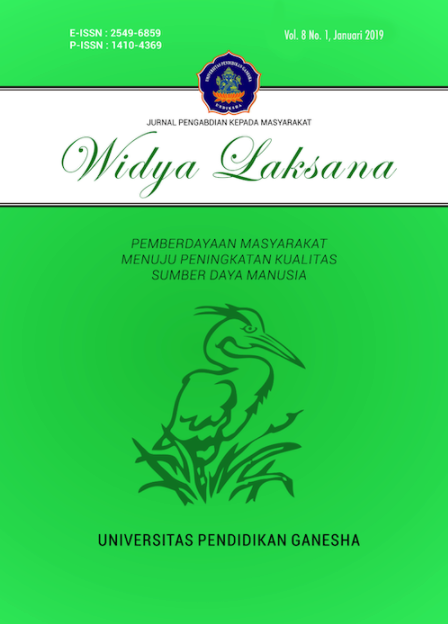PEMBERDAYAAN POKDARWIS DESA KEMLOKO DALAM PENGEMBANGAN DESA WISATA MELALUI PELATIHAN BAHASA INGGRIS FOR TOURISM
DOI:
https://doi.org/10.23887/jwl.v10i1.30121Abstrak
Masih rendahnya kemampuan berbahasa inggris yang dimiliki masyarakat Desa Wisata Kemloko merupakan masalah serius yang perlu segera diberikan solusi. Apalagi dengan antusiasme wisatawan mancanegara yang datang berkunjung ke desa wisata ini untuk melihat berbagai atraksi wisata. Atas dasar tersebut, menjadi penting kiranya untuk dilakukan pelatihan bahasa inggris agar mereka terampil menggunakan bahasa inggris. Metode pengabdian masyarakat ini dikembangkan dengan menggunakan pendekatan partisipatif. Hasil kegiatan pengabdian menunjukkan bahwa masyarakat Kemloko dalam mengikuti pengabdian terlihat antusias. Hal ini terlihat dari upaya peserta untuk mengikuti pelatihan di tengah kegiatan sehari-hari yang padat. Peserta selalu berupaya meluangkan waktu untuk mengikuti pelatihan ini setiap minggunya. Pada pertemuan pertama masyarakat masih terlihat canggung dan enggan bertanya sehingga kegiatan masih terlihat monoton tanpa adanya dialog interaktif. Akan tetapi, suasana sangat terlihat jelas berbeda ketika pertemuan selanjutnya. Peserta selalu bertanya kepada pemateri apabila ada hal yang dibingungkan dan belum jelas sehingga serangkaian kegiatan menjadi interaktif dan berjalan lancar.
Kata kunci: Pelatihan, Bahasa Inggris, Kemloko.
Abstract
The low level of English language skills possessed by the people of Kemloko Tourism Village is a serious problem that needs immediate solutions. Especially with the enthusiasm of foreign tourists who come to visit this tourist village to see various tourist attractions. On this basis, it is important to conduct English language training so that they are skilled in using English. This community service method was developed using a participatory approach. The results of the service activities show that the Kemloko community in participating in the service looks enthusiastic. This can be seen from the efforts of the participants to take part in the training amidst their busy daily activities. Participants always try to take the time to attend this training every week. At the first meeting, the community still looked awkward and reluctant to ask questions so that the activities still looked monotonous without any interactive dialogue. However, the atmosphere was different during the next meeting. Participants always ask the speakers if there are things that are confused and unclear so that a series of activities become interactive and run smoothly.
Keywords: Training, English, Kemloko.
Referensi
Andriyani, A., Martono, E., Muhamad. 2017. Pemberdayaan Masyarakat Melalui Pengembangan Desa Wisata Dan Implikasinya Terhadap Ketahanan Sosial Budaya Wilayah (Studi Di Desa Wisata Penglipuran Bali), (Online), (https://journal.ugm.ac.id/jkn/article/download/18006/15758), diakses pada 20 November 2020. 23(1), 1-16.
Egar, Ngasbun. 2017. Pemberdayaan Remaja Desa Wisata Bendosari Kecamatan Plantungan Kabupaten Kendal melalui Pelatihan Kepemanduwisataan, (Online), (https://media.neliti.com/media/publications/266896-pemberdayaan-remaja-desa-wisata-bendosar-488b3221.pdf), diakses pada 11 Desember 2019.
Harahap, Erni Febrina. 2012. Pemberdayaan Masyarakat dalam Bidang Ekonomi untuk Mewujudkan Ekonomi Nasional yang tangguh dan Mandiri, (Online), (http://journal.unitas-pdg.ac.id/downlotfile.php?file=5.Erni%20Febrina%20Harrahap-Pemberdayaan%20Masyarakat%20Dlm%20Bid.%20Ekonomi.pdf), diakses pada 20 November 2020. 3(2), 78-96.
Kurniawati, D., Supriyono, B., Hanafi, I. 2013. Pemberdayaan Masyarakat di Bidang Usaha Ekonomi (Studi pada Badan Pemberdayaan Masyarakat Kota Mojokerto), (Online), (http://administrasipublik.studentjournal.ub.ac.id/index.php/jap/article/view/129), diakses pada 20 November 2020. 1(4), 9-14.
Noor, Munawar. 2011. Pemberdayaan Masyarakat, (Online), (https://core.ac.uk/download/pdf/234022402.pdf), diakses pada 20 November 2020. 1(2), 87-99.
Nuryanti, Wiendu. 1993. Concept, Perspective and Challenges, Makalah bagian dari Laporan Konferensi Internasional mengenai Pariwisata Budaya. Yogyakarta: Gadjah Mada University Press.
Pitana, I Gede dan Gayatri. 2005. Sosiologi Pariwisata. Yogyakarta: Penerbit Andi.
Sulistiyani, A.T. 2004. Kemitraan dan ModelModel Pemberdayaan. Yogyakarta: Gava Media.
Sumodiningrat, Gunawan. 1999. Pemberdayaan Masyarakat dan Jaring Pengaman Sosial. Gramedia: Jakarta.
Yoeti, Oka A. 1991. Pengantar Ilmu Pariwisata. Bandung: Angkasa.
Unduhan
Diterbitkan
Terbitan
Bagian
Lisensi
Authors who publish with the Widya Laksana agree to the following terms:- Authors retain copyright and grant the journal the right of first publication with the work simultaneously licensed under a Creative Commons Attribution License (CC BY-SA 4.0) that allows others to share the work with an acknowledgment of the work's authorship and initial publication in this journal
- Authors are able to enter into separate, additional contractual arrangements for the non-exclusive distribution of the journal's published version of the work (e.g., post it to an institutional repository or publish it in a book), with an acknowledgment of its initial publication in this journal.
- Authors are permitted and encouraged to post their work online (e.g., in institutional repositories or on their website) prior to and during the submission process, as it can lead to productive exchanges, as well as earlier and greater citation of published work. (See The Effect of Open Access)



